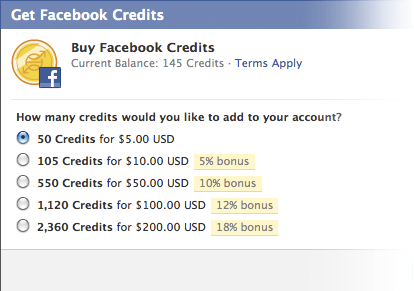Editor’s note: Peter Vogel is co-founder of Plink, a Facebook Credits-based loyalty program that rewards Facebook members for dining and making purchases at their favorite restaurants and stores. Reach him via email at peter@plink.com or follow him on Twitter @pvogel.
Although introduced in 2009, we’ve only seen glimpses of what Facebook Credits will become when it grows up, and Facebook is about to kick off the training wheels.
So far, Facebook has done little to promote the virtual currency of Facebook Credits and it’s been used almost entirely in social gaming. But even with this limited exposure and promotion, Facebook Credits’ fees already represents $557 Million in revenue or 15 percent of Facebook’s entire 2011 revenue. Even more remarkable is that less than two percent of Facebook users bought virtual goods with Facebook Credits in 2011, yet it still represented 15 percent of Facebook’s revenue, primarily from just one vertical – social gaming. One vertical and two percent of members represented 15 percent of Facebook’s 2011 revenue!
Why hasn’t Facebook promoted the Credits Economy more aggressively?
Some believe that Facebook has waited to promote Credits as a Facebook-wide currency until after the IPO; a valuation based on advertising revenue is less volatile and less likely to attract concern from investors.
A second theory is that Facebook tends to introduce features slowly and let them develop; even though Facebook’s App Platform was opened in 2007 and hundreds of millions of members were playing games, Facebook did little to monetize the platform until they required game developers to use Facebook to process payments on July 1, 2011, about four years later.
Now, about three-and-a-half years after Facebook Credits were launched, Facebook is ready and they’re going to need the revenue to satisfy shareholder expectations.
What will change after the IPO?
It certainly looks like, post-IPO, Facebook will begin promoting Facebook Credits heavily and will soon be making Credits easier for consumers to use and more profitable for developers.
On the consumer front, we’re predicting that a user’s Facebook Credits balance will be more prominently displayed (still privately) on their profile. Currently it’s hidden a few clicks deep under Home>Account Setting>Payments. Facebook will also start featuring a list of places where members can spend Credits. Facebook’s new App Center is a great start for this, increasing the ease with which users can find new apps – not just games – some for free, some for purchase with Credits. Facebook could also feature a new category under “Favorites,” listing recommended ways to spend Credits based on that specific member’s interests, friends, etc.
In addition, Facebook will likely run more promotions offering consumers Credits at a discount, “Buy $1 in Credits and get $2-3 dollars worth of Credits for free.” This is similar to promotions Facebook ran in games just few months ago, but Facebook will use the same strategy outside of games to attract a wider audience.
Developers will also benefit from all the promotion that makes Credits easier to use for consumers, but for most developers, increased discoverability is key. No matter how great an app or game they build, if a consumer can’t find it, everyone loses. For the Facebook credits economy to flourish, discoverability is essential; increased listings, rankings, categories and a well organized App Center is key and Facebook is already on their way to providing developers with these features.
Facebook has also hinted, with little explanation, that in certain verticals outside of gaming, Facebook will consider lowering the 30 percent tax they typically keep on Credit transactions. This may open the door for Open Graph participants like Netflix, Spotify and the Washington Post, to name a few, to begin accepting Credits for monthly subscription plans, created just for Facebook. Since these partners and more than 50 others and counting are all integrated into Facebook’s Open Graph, already with the ability to share “like’s” “listening to,” and “watching,” the next logical step is to begin accepting Credits as payment. By lowering the 30 percent fee it is now financially possible for these partners to participate in the Facebook economy.
What does all this mean for the Facebook Credits Economy?
I’ve predicted and still believe the revenue generated from Facebook Credits will double every year for the next five year, eclipsing the revenue generated by advertising by 2016.
Credits will emerge from gaming this year and be used Facebook-wide for all sorts of paid apps ranging from dating to entertainment (TV, movies, music and live streaming of pay-per-view events) to more functional utility apps you might be used to buying for your smart-phone.
Facebook Credits is about to grow up fast.
Social gaming was its birth, the new App Center is its first step … and we’re all waiting to hear its first few words. I’m guessing it will be some version of, “Pay… here… always.”
